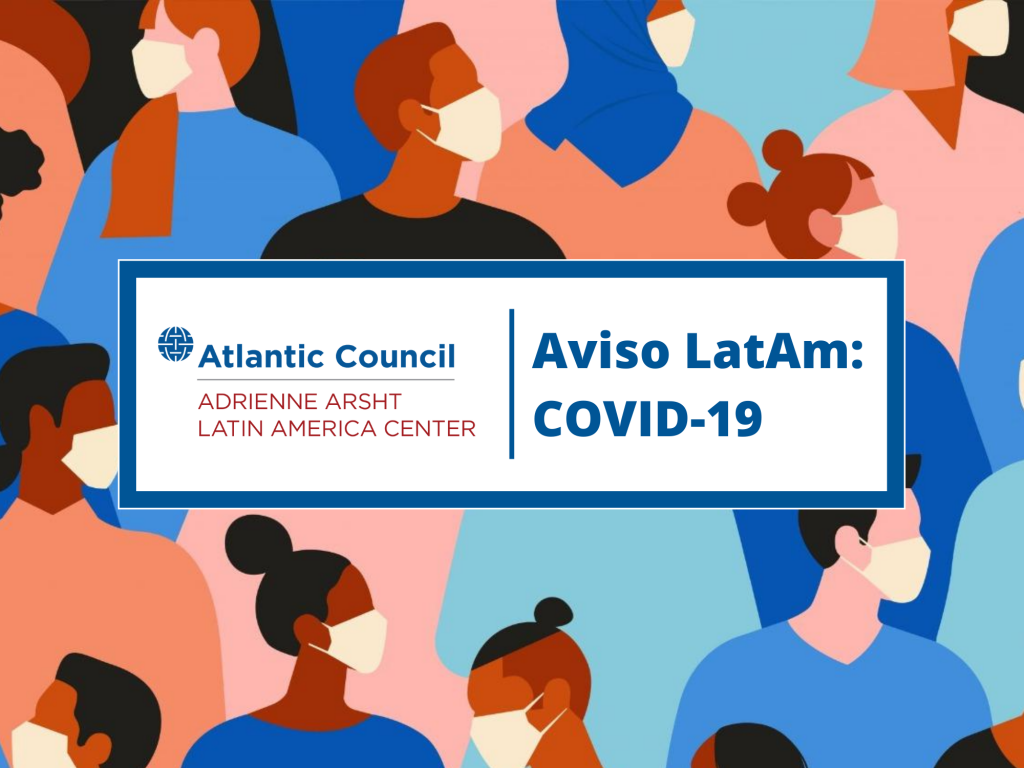What You Should Know
- Food Insecurity: Around 7.7 million people in Honduras, El Salvador, Guatemala, and Nicaragua were acutely food insecure in 2020. In Guatemala alone, food insecurity worsened by 22 percent in the last year.
- 16 percent: The reduction in working hours experienced by Latin Americans in 2020 compared to 2019, which was almost twice the average loss seen in the rest of the world.
- Sputnik V: Mexican officials say Russia will be unable to produce enough vaccine doses of its Sputnik V vaccine in time to supply Mexicans who received the first dose.
- Colombia: Protests over rising inequality exacerbated by the pandemic have continued in Colombia, where 60 percent of the population works in the informal sector and the poverty rate has grown to 42.5 percent. Atlantic Council experts available for comment.
By the numbers
- Vaccinations administered per capita (vaccines administered per 100 people):Chile (84) #6 worldwide, Uruguay (61) #16 worldwide, Dominica (45) #20 worldwide, Antigua and Barbuda (32) #48 worldwide, Barbados (26) #54 worldwide, Saint Kitts and Nevis (25) #55 worldwide, Dominican Republic (23) #57 worldwide, Brazil (23) #58 worldwide, Costa Rica (22) #60 worldwide, Argentina (21) #62 worldwide, Panama (18) #64 worldwide, Source: nytimes.com
Health + Innovation
- Bolivia: The government is in talks with Russia to produce the Sputnik V vaccine domestically.
- India Variant: The COVID-19 variant from India, named B.1.617, has been detected in Mexico.
- Ecuador: Ecuador’s vaccination plan has progressed significantly, with the government administering half of its 1.14 million doses in the last three weeks. Ecuador has secured agreements for 20 million doses — a full breakdown per manufacturer is illustrated in our vaccine tracker.
- COVAX: On May 10, Trinidad and Tobago, Guyana, and Suriname received their second batch of COVID-19 AstraZeneca vaccines from COVAX. Additional doses will be delivered to other Caribbean countries throughout the week.
- Pfizer-BioNTech: Pfizer and BioNTech have begun an application to request US Food and Drug Administration approval for its COVID-19 vaccine. It is the first vaccine maker in the US to request full approval.
Economies in Focus
Economic Impact
- Brazil’s three largest private sector banks–Itaú Unibanco, Banco Bradesco, and Santander Brasil–published Q1 earnings with a combined net profit of $3.2 billion, up from $2.1 billion a year ago. The earnings signal a better-than-expected outlook for the country’s economic recovery.
- Colombia’s peso fell for the fifth consecutive session by 0.8 percent, reaching a six-month low, as nationwide protests are set to continue.
- Argentina’s Federal Tax Bureau reports 235,381 jobs lost and around 23,000 companies closed due to pandemic-induced economic contraction.
- Peru’s export levels surpassed pre-pandemic levels in Q1 in several sectors of the economy including agriculture, textiles, and chemicals.
- The World Economic Forum (WEF) conducted a Gallup poll and found that one in two people have lower earnings due to COVID-19 disruptions. In countries like Bolivia, Honduras, and Ecuador, more than 70 percent of those polled said they earned less than pre-pandemic.
Hemispheric Aid
- The Biden Administration is working alongside PAHO to give Brazil access to $20 million of medication to intubate patients infected with COVID-19. On May 7, the Brazilian government welcomed a call from the United States to discuss vaccine patents as a way to increase the distribution of COVID-19 vaccines.
- PAHO acknowledged that Haiti has not finalized necessary legal and administrative arrangements to receive vaccines.
- El Salvador is negotiating with the IMF for a $1 billion economic assistance program through 2023.
- On May 6, the IMF reached staff-level agreement with Honduras to raise $769 million to support the country’s recovery from two hurricanes and the pandemic.
Quarantines + Travel Restrictions
Quarantines + reopenings
- Bogotá relaxed COVID-19 restrictions in light of Mother’s Day weekend despite Colombia not having yet passed the third wave of the pandemic. The nightly curfew at 8:00 p.m. will continue amid nationwide protests.
Border and travel restrictions
- Jamaica extended COVID-19 travel restrictions until June 2, 2021. Existing protocols remain, including the requirement for all travelers to present a negative COVID-19 test administered within three days of travel. The travel ban has been extended to include non-admittance of travelers coming from India and Trinidad and Tobago through June 2, 2021.
- Panama issued regulations for travelers arriving from India stating that they must carry a negative COVID-19 test forty-eight hours before arrival.
In Focus: Fears for Latin America’s Youth
- With nearly 40 percent of global COVID-19 deaths in the Americas, the Pan American Health Organization (PAHO) reported a surge of hospitalizations and deaths of younger people in the region. In Chile, hospitalization rates of people under thirty-nine years of age rose by more than 70 percent in the past few months.
- The pandemic has aggravated the educational systems across Latin America. A UNICEF report found that, on average, Latin American children have lost nearly three months more of class time than students across the world and predicts that over three million may never return to school.
- Civil society organizations in Colombia have already registered sharp increases in the recruitment of children by criminal groups as a result of missed days in school.
